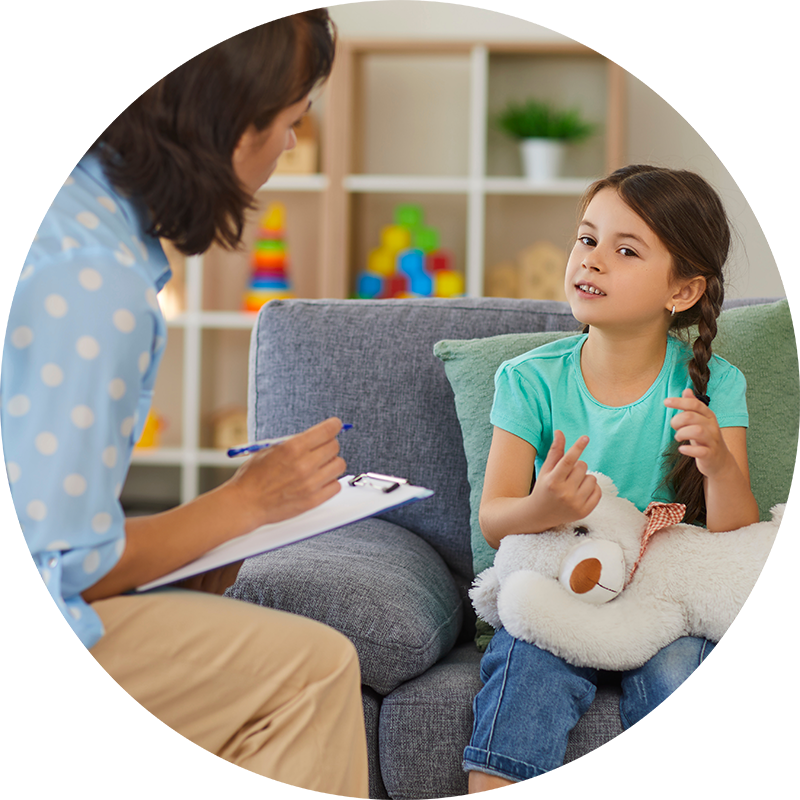
Psychotherapy to build coping skills, confidence, and emotional well-being
At Exploration Kids Therapy, our pediatric psychotherapy services help children understand their emotions, manage challenges, and develop healthy coping strategies. Whether your child is experiencing anxiety, mood changes, behavioral struggles, or life transitions, our therapists provide a safe, supportive space for growth. Using evidence-based approaches tailored to each child’s unique needs, we help strengthen self-awareness, problem-solving, and emotional regulation. Through collaboration with families and educators, we empower children to build resilience, confidence, and the tools they need to thrive in daily life.

Psychotherapy helps children recognize, understand, and express their emotions in healthy ways. Through guided support and practical strategies, children learn how to manage stress, navigate challenges, and build emotional resilience that supports their well-being at home, school, and in relationships.
Therapy encourages children to explore their thoughts and feelings in a safe, supportive environment. By improving communication and self-awareness, children gain tools to express themselves clearly, develop empathy, and strengthen relationships with family and peers.
As children learn to handle difficult emotions and experiences, they build confidence and a stronger sense of self. Psychotherapy supports long-term mental and emotional health, helping children approach life’s challenges with greater balance, self-assurance, and hope.

Psychotherapy is a collaborative journey that grows with your child. Our therapists work closely with families, educators, and healthcare providers to create a consistent support system. Periodic check-ins and evaluations ensure therapy continues to foster resilience, confidence, and long-term well-being.
Pediatric feeding therapy helps children who have difficulty eating, chewing, swallowing, or trying new foods. Therapy focuses on building safe, positive, and enjoyable mealtime experiences so children can meet their nutritional needs and grow with confidence.
Children who show signs of anxiety, mood changes, behavioral struggles, difficulty coping with stress, or challenges with social interactions may benefit from psychotherapy. A professional consultation can help determine whether therapy is the right fit for your child’s needs
The therapist conducts an assessment to understand your child’s emotional, behavioral, and social functioning. This may include interviews, questionnaires, and input from parents, teachers, and caregivers. The evaluation helps identify areas of concern and guides the therapeutic approach.
Psychotherapy can begin as early as preschool age and continue through adolescence. Sessions are tailored to meet each child’s developmental level, using play, talk, or creative expression to help them feel comfortable and engaged.
Sessions typically last 30–60 minutes and may occur weekly or more often, depending on your child’s individualized treatment plan and progress.
Yes. Psychotherapy is designed to be supportive and engaging. Therapists build trust through play, conversation, and creative activities that help children feel understood, validated, and safe to share their experiences.
Your therapist will communicate regularly about your child’s progress, sharing insights and strategies to reinforce emotional growth at home. Signs of progress may include improved mood, stronger coping skills, better communication, and increased confidence.
Absolutely. Psychotherapy can help children manage anxiety, frustration, and attention difficulties that impact school performance and relationships. Therapists collaborate with families and educators to support consistency across environments.
The duration of therapy depends on your child’s needs and goals. Some children benefit from short-term therapy for specific challenges, while others may participate longer to address ongoing emotional or behavioral patterns.
Therapists provide parents with strategies to reinforce progress at home—such as emotion labeling, coping routines, and communication techniques. Encouraging open dialogue and consistent emotional support helps your child continue growing between sessions.